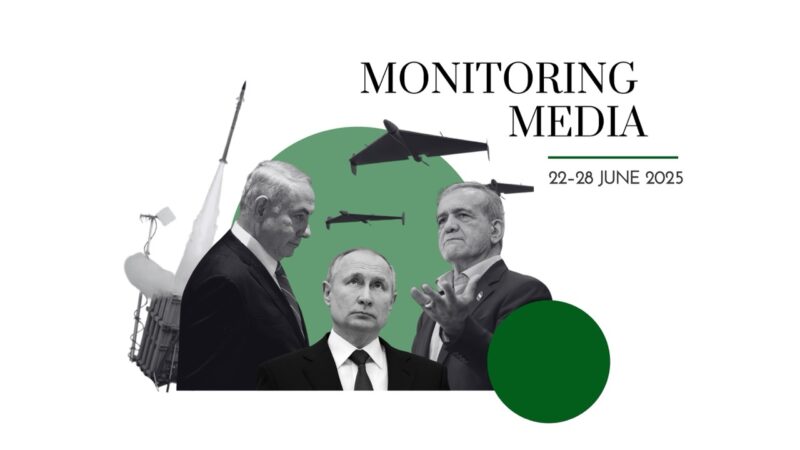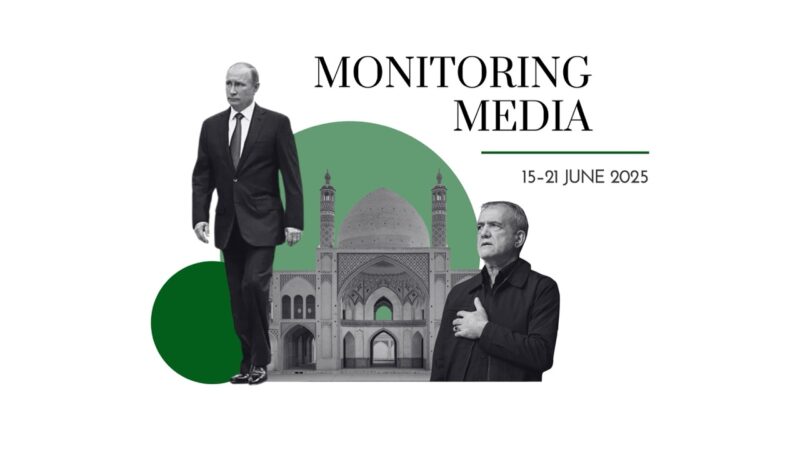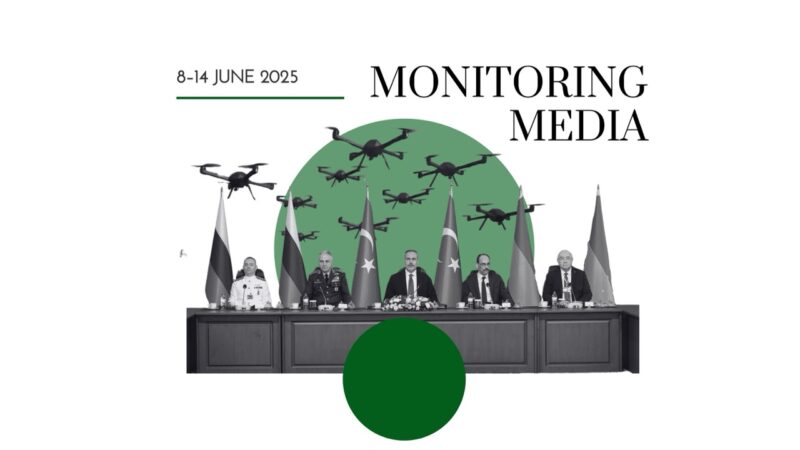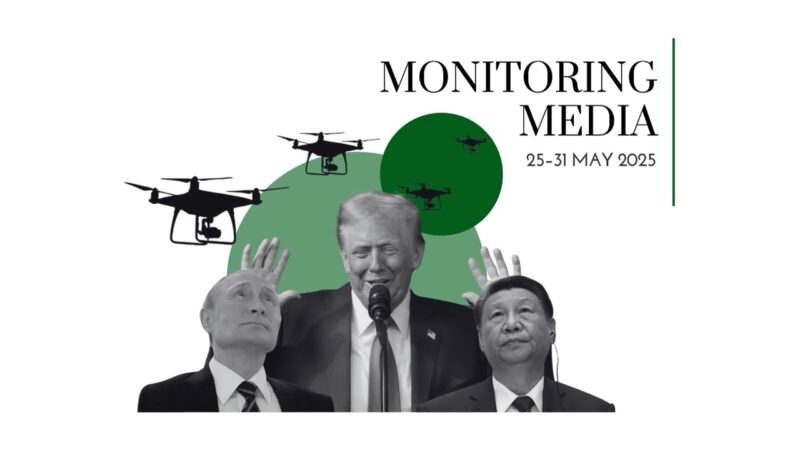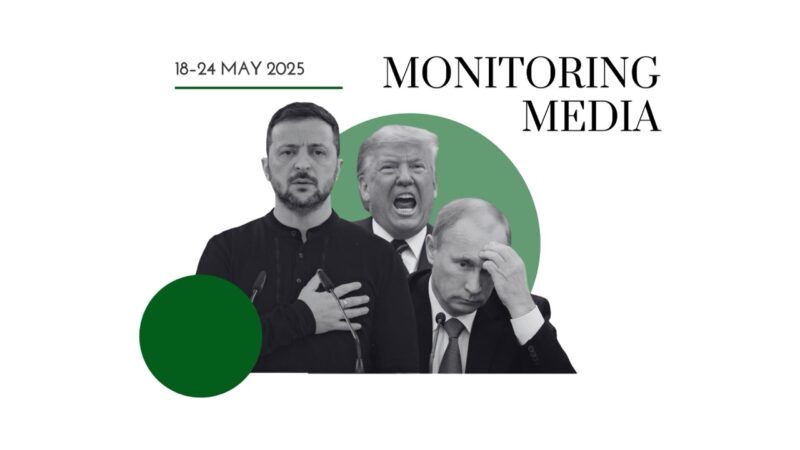A year into the full-scale invasion, supply of Western tanks to Ukraine is unlikely

CIUS report on Canadian media coverage of Ukrainian affairs, 15–29 January 2023
Five media outlets—The Globe and Mail, Toronto Star, Vancouver Sun, Le Journal de Montréal, and La Presse— were surveyed to prepare this report on how the situation in Ukraine and Canada’s role in the war were portrayed in Canadian media during the two last weeks of January 2023. The sample of publications was selected based on their impact on public opinion as well as their professional reputation, popularity among readers, and topical relevance.
This analysis reviews only original reporting about Ukraine produced by the selected publications in the past fourteen days. It covers texts from special sections on Ukraine, paper editions of the magazines, and opinion columns and editorials.
Key messages:
- Liberating Crimea is essential to Ukraine’s victory;
- Defence procurement for Ukraine once again highlights Canada’s problems at home;
- Russia’s suspension from sport, cultural events shows Russians that Putin’s actions are condemned around the world.
Main topics:
Crimea cannot be traded for false peace. Anastasiya Ringis (Globe and Mail) argues in her opinion piece that the Western world should not buy into Russian propaganda when it comes to Ukraine’s intention of liberating Crimea. “Crimea is not different from any other part of Ukraine,” she writes, adding that leaving the autonomous republic under Russian control would only make President Putin’s land grab “permanent.”
Ringis reminds readers that Russia has been justifying its annexation of Crimea and other Ukrainian territories by claiming natural law—that the regions have always been Russian and so should remain Russian. “This argument is ridiculous, particularly given that many lands in Europe have passed from one dominant power to another over the centuries. It also creates dangerous pretexts allowing for the continuing revision of existing borders,” she writes.
Nevertheless, international voices calling for a peace deal have grown louder, with their main argument being that Russia is reserving the right to use nuclear weapons “when the very existence of the state is in jeopardy.” Putin considers Crimea to be part of Russia (even though he is legally and morally wrong). So Ukraine, these voices suggest, should retreat in exchange for restoration of the status quo as of February 2022.
But according to Ringis, despite nine years of annexation Crimea still remains Ukrainian territory that Kyiv has every right to try to take back—just like it did with Kharkiv oblast and Kherson city in 2022. “Last year, the Ukrainian cities of Kherson and Izium had fallen to Russian troops; a few months later, the Russians were pushed out by Ukraine’s advancing army. And despite his threats of a nuclear response, nothing happened; the liberated cities were soon greeting Ukrainian troops with tears of happiness. When Crimea is liberated, they will be greeted with the same.”
Retrieving remains of the dead in Ukraine’s east is a deadly task in itself. Mark MacKinnon (Globe and Mail) documents the lives of Ukrainian volunteers in Kharkiv oblast, which borders the Russian Federation. The Black Tulip group repatriates those who gave their lives fighting for Ukraine. In addition they also retrieve the bodies of Russian soldiers, thereby helping to bring fallen Ukrainian soldiers home. “If the Russian army accepts that the fallen soldier was one of theirs, they are added to a list for a potential exchange of the dead. Several such exchanges have taken place so far in the 11-month-old war, with hundreds of bodies being handed over the front line at each meeting.”
MacKinnon also provides some insight into the restricted data on casualties. The Russian military, he writes, has officially acknowledged losing only 5,937 soldiers in Ukraine—a number that hasn’t been updated since September. “Western estimates put Russian losses at more than 10 times that figure, while Ukraine claims to have killed about 120,000 invading soldiers.”
MacKinnon quotes Mediazona, an independent Russian news website, which along with the BBC’s Russian service has used public records, official media reports, and social media posts to confirm that at least 11,662 Russians have died over the 11 months of war in Ukraine. According to Pyotr Verzilov, the Russian-Canadian publisher of Mediazona, even that is a dramatic underestimate. “This is a count of bodies that can be essentially proven. It’s kind of the minimal official count. Russia can downplay it, but everybody on this list can be traced to an official notice,” Verzilov is quoted as saying. “I would say that the amount of killed soldiers looks like it’s closer to 70, 80, or 90,000.”
The author concludes on a grim note: one of the volunteers interviewed for this article was killed after his vehicle hit an anti-tank mine. “[Mr. Sosnenko] died in hospital, joining the tens of thousands of other Ukrainian civilians who have been killed in this invasion.”
Evidence indicates Russia’s deliberate use of rape as a military tactic in the war.
Katharine Lake Berz (Toronto Star) reminds readers that the United Nations have documented about 100 cases of rape, mostly of women and children, during Russia’s full-scale invasion of Ukraine. However, that is but “a small indication of the extent of the issue.”
The author quotes Susanna Anhelova, a senior trauma therapist who has overseen rehabilitation treatment for more than 1,000 women since Russia escalated its violence in Ukraine. Anhelova said it is “clear to her that Russia has a policy to dehumanize women and their families.”
“Anhelova and her team see Russia’s sexual aggression as part of a larger objective: genocide of the Ukrainian people,” Lake Berz writes. She adds that international legal scholars agree with Anhelova’s assessment. A report by three teams of experts assembled by the New Lines Institute and the Raoul Wallenberg Centre for Human Rights cites “a widespread and systematic pattern, including gang rape, rape in homes or shelters, rape of parents in front of children and vice versa,” as part of a genocide targeting Ukrainians, in violation of the United Nations Genocide Convention.
Lake Berz admits that victims are often reluctant to report such cases to police or human rights organizations out of fear of stigma and retraumatization. The scarcity of direct reports of rape cases—which may number in the thousands, according to experts—makes it hard for investigators to fully prove what appears to be an official Russian policy, she writes. “Ukraine’s first trial of a Russian soldier charged in absentia with raping a Ukrainian woman only began in June and is still going on.”
Canada’s military aid to Ukraine once again exposes problems at home. John Ivison (Vancouver Sun) questions in his opinion piece whether Canada’s donation to Ukraine of 200 armoured personnel carriers, manufactured by Roshel of Mississauga, Ontario, is the best use of $90 million. Roshel’s Senator APC is a civilian armoured vehicle designed for law enforcement, Ivison writes, adding that “it would stop a bullet but is not intended to be used in combat zones.”
Military experts point out that Ukraine benefits most when aid is rendered at scale, since it justifies the logistical challenges involved with putting equipment into service and keeping it there. “A much better idea would be for Canada to commit to spend $90 million on upgrades and then supply Ukraine from its inventory of Leopard tanks, to match similar commitments from allies like Poland and Finland,” Ivison writes.
Canada began acquiring Leopard tanks during the Afghan war and has 82 in stock. According to the author’s sources, some of those tanks have not been modified or upgraded since they were originally manufactured in the mid-1980s; however, at least ¼ of the fleet has been modified with additional armour and longer gun barrels. “With some upgrades, they could be sent for use in Ukraine. That is perhaps where Canada’s resources would be best directed,” Ivison writes. “But a handful of useful tanks from a fleet of more than 80 is testimony to the years of under-investment that the war in Ukraine has exposed—a list that also includes an absence of modern anti-tank weapons, a complete lack of air defence systems, and a shortage of artillery.”
More Western weapons will bring Ukraine’s victory closer. Eugene Czolij (Toronto Star) calls readers’ attention to the fact that even though there is no visible end in sight to Russia’s war in Ukraine, the West has power to end the suffering of Ukrainian refugees and contribute to our collective well-being. “Western leaders should now convert all their good intentions into a tangible political will to provide Ukraine without further delay all the necessary weapons to end this war and thereby ensure peace, security, and stability in the world.” Czolij also reminds readers, by citing Ukraine’s Prime Minister Denys Shmyhal, that at the beginning of June 2022 the damages caused by Russia’s all-out war against Ukraine were an estimated $350 billion USD and that this figure has now doubled and surpasses $700 billion.
Ukrainian publishing house keeps working in exile and amidst war. Paul Waldie (Globe and Mail) highlights the story of Ukraine’s Vivat Publishing Ltd., which has managed to continue operating despite the war. “The publisher, which is based in Kharkiv, had to shut down immediately after the invasion began on Feb. 24, 2022. Many of the roughly 100 staff fled to cities across Europe. (Yuliya) Orlova (Vivat’s managing director) and Olena Rybka, the deputy chief editor, went to Warsaw, Poland.” Despite the challenges, Waldie writes, Vivat released 350 books last year, and the company plans to publish 400 books this year—“and for those who work there, Vivat has become far more than a business.”
Worth your attention:
Thomas Walkom (Toronto Star) argues in his op-ed that the West’s decision to supply Ukraine with tanks will set the scene for “a new and bloody chapter in the war.” He adds that with its decision to focus on tank warfare, “NATO’s campaign against Russia has entered a new phase.”
The MMS reminds readers that the last year of Russia’s war in Ukraine already cost at least 7,000 civilians their lives—those are approximate estimates by the United Nations, and the actual numbers might be considerably higher. According to Ukraine’s Office of the Prosecutor General, at least 461 children have been killed as a result of Russia’s war.
US general Mark Milley estimates that around 100,000 Russian and 100,000 Ukrainian soldiers have been killed or injured in the war (Ukraine’s military casualty numbers are not available publicly, however, the Armed Forces’ Commander-in-Chief, Valerii Zaluzhnyi, was quoted in Ukrainian media in August saying that 9,000 Ukrainian soldiers had died so far).
Taking this into account, it’s not quite clear whether the author considers this past year of the war “not bloody” or whether he believes that with Western tank supplies the casualties will be even greater.
The Ukrainian English-language publication Kyiv Independent (MMS analyst Olena Goncharova-LaFoy is its Canadian correspondent and development manager) stated in its latest editorial that “arming Ukraine won’t escalate war, but reluctance to do so will.”
“Even when Russia launched its full-scale invasion of Ukraine on Feb. 24, 2022, the West opposed the idea of supplying all the weapons that Ukraine needed to fight Russia. The main excuse was, per usual, the fear of ‘escalation,’” reads the editorial. “But later, as Russia’s brutal terror and atrocities shocked the world, the West began to cross its self-imposed ‘red lines’ despite initially being reluctant to supply lethal aid. Only then did Ukraine begin to receive air defense systems, artillery, armored vehicles, HIMARS multiple rocket launchers, armored vehicles, and tanks, albeit slowly.”
Instead of “de-escalating” the war, this policy of Western hesitancy and refusals has emboldened Russian dictator Vladimir Putin to launch new rounds of aggression, writes the Kyiv Independent.
Walcom argues in his opinion piece that Western supply of tanks might prompt Russia to act even more brutally than before. “What will the Russians do? Moscow already views the Ukraine war as a proxy battle between NATO and Russia. It’s a self-serving description (conveniently ignores Russia’s invasion of Ukraine), but it is not entirely wrong.” He continues: “What will Russia do if faced with an American tank based in Ukraine? What will Russia do if faced with a Canadian tank manufactured in Germany and based in Ukraine? What will Ottawa do if Russia fires on that Canadian tank manufactured in Germany and based in Ukraine?”
Walcom concludes his opinion piece by saying that “Ukraine’s corruption problem continues unabated” and “Russia and Ukraine are two of the most corrupt states in Europe.” He backs this by citing the 2021 Transparency International ranking, which placed Ukraine as 122nd of the 180 most corrupt countries in the world.
However, it’s worth mentioning that in 2022, Ukraine climbed to 116th position of 180—amid a full-scale invasion and fight for its very existence. Walcom did not provide this information was not provided in Walcom’s piece.
Exposing Ukraine’s corruption is an important task, and Ukrainian independent media and civil society have been engaged in doing just that for the past decade. And they didn’t stop doing this in 2022, either. Ukraine’s battle with corruption is far from over. However, just as many people underestimated the country’s ability to resist the Russian invasion, many today don’t quite realize the strength of its anti-corruption movement.
Orysia Lutsevych, who heads the Ukraine Forum at Chatham House, recently wrote in her opinion piece published in the Guardian: “Eroding international trust in Ukraine’s government is one of Russia’s key objectives, in the hope that it could slow or reduce Western material and political assistance. The narrative that Ukraine is a basket case, unreformable and utterly corrupted, has long been a Kremlin propaganda narrative.” Indeed, the existence of corruption in Ukraine has been used by Putin to justify the war, accusing the government of subverting the interests of the Ukrainian people in a televised address three days before the invasion. This same narrative can’t be used to halt Western support when Ukraine has been proving that it takes eradicating corruption seriously, especially in times of war.
Below are a few reactions of Ukraine’s Western backers in this regard:
On 24 January 2023 US Democratic and Republican lawmakers praised Ukraine’s government for taking swift action against corruption and insisted that US military and humanitarian aid to President Zelensky’s government should continue.
On 26 January 2023 Celeste Wallander, the US assistant secretary of defense for international security affairs, said at a House hearing that the Biden administration “has not seen credible evidence of any diversion of US-provided weapons outside of Ukraine.”
On 31 January a US Treasury Department representative said the department “had no indication that US funds had been misused in Ukraine” and that it would continue to work closely with Ukrainian authorities to ensure appropriate safeguards were in place to prevent diversion of funds.
During the EU-Ukraine summit in Kyiv on 3 February, EC President Ursula von der Leyen stated that she is “comforted” to see that Ukraine’s “anti-corruption bodies are on alert and effective in detecting corruption cases.”
Here are some of our Francophone selections from this time period:
Loïc Tassé (Le Journal de Montréal) argues in his op-ed titled “La Russie doit être suspendue partout!” (Russia must be suspended everywhere) that the international community should go much further than suspension of Russia at the Paris Olympics.
“(It must do so) for two reasons, one moral and the other political. Moral: Vladimir Putin’s Russia is waging a genocidal war of aggression against Ukraine. Political: Russia’s suspension from various international activities is a great way to show Russians how condemned Putin’s actions are around the world. The more time passes, the more [French president] Emmanuel Macron’s concern not to humiliate Russia seems futile. Moreover, it is not Russia that should feel humiliated but Putin and his band of murders.”
Tasse also suggests that Russia should be suspended from all international events in all fields, whether sporting, cultural, political, or economic. “It should be understood that the Russian leadership is waging a war of genocidal aggression. These are extremely serious crimes that place Russian leaders in the same category as the Pol Pots, Adolf Hitlers, and other monsters that have plagued history.”
“The Russian war against Ukraine, through its barbarism and its desire to annihilate Ukrainians and their culture, goes far beyond, for example, the Soviet war against Afghanistan. A war which had, however, led to the boycott of the Moscow Olympics in 1980.”
He concludes with a question whether Canada should provide an example to the world by boycotting Russia. He answers it for the readers himself: “(Canada) used to. But the Canadian government lost that courage a long time ago.”
Isabelle Hachey (La Presse) writes about southern Ukraine’s Centre for Social and Psychological Rehabilitation of Children in Stepanivka, on the outskirts of Kherson, which was liberated by the Ukrainian military in late fall. Hachey writes that the centre’s employees were hoping to be evacuated, but when it proved too dangerous they knew they had to hide the children from the occupying forces. In October, the centre’s employees took on 17 children themselves and came up with a story of nephews and nieces who had survived the front for neighbours who were too curious. If exposed, the children would be taken to Russia and the educators could have ended up in torture chambers. “Why expose yourself to such danger? These are our children,” the author quotes the centre’s director, Volodymyr Sahaidak. “What the Russians are doing is a crime. There is no worse crime than stealing children.” At least 13,000 children have been transferred to Russia since the start of the full-scale war, according to Ukrainian authorities. At least 1,000 of those were abducted in Kherson.
Translations from French by Olena Goncharova-LaFoy.
